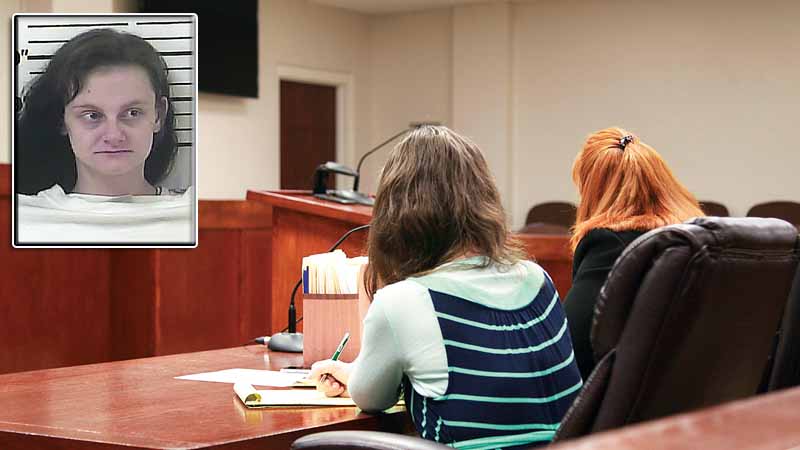Judge rules victim’s video interview admissible at sexual abuse trial
Published 6:11 pm Wednesday, March 22, 2017

- Star Photo/Abby Morris-Frye Amber Ray, second from right and shown in inset, takes notes as she and her attorney Nikki Himebaugh, at right, listen to testimony during a court hearing.
A Carter County judge ruled a videotaped interview with an alleged child victim of sexual abuse will be admissible in court when the woman charged with his abuse stands trial next month.
In May 2015, a Carter County Grand Jury indicted Amber Nicole Ray, 27, of Johnson City, on charges of rape of a child and incest. The offenses allegedly occurred between August 2012 and January 2013 while Ray was living in Elizabethton. The alleged victim was five years old at that time.
On Wednesday, Carter County Criminal Court Judge Stacy Street heard evidence and testimony regarding a videotaped interview with the alleged victim which was conducted at the Child Advocacy Center in March 2015 by a forensic interviewer. The alleged victim was seven years old at the time the interview was conducted.
Nikki Himebaugh, the court-appointed counsel for Ray, had filed a motion on behalf of her client seeking to have the video suppressed from evidence when the case goes to trial next month. In her argument, Himebaugh contested that the videotaped interview was hearsay evidence and also violated Ray’s constitutional right to confront her accuser and have the witness subjected to cross-examination.
Assistant District Attorney Janet Hardin argued that state law expressly provides an exception to allow videotaped statements given by child victims of sexual abuse under particular circumstances and said this case meets those requirements. She also stated the Tennessee Supreme Court ruled that such video statements do not violate a defendant’s constitutional right if the witness is provided for cross-examination at the trial.
The court heard testimony from the Director of the Child Advocacy Center for the First Judicial District Lemy Dao and the CAC’s Forensic Interviewer Carey Lewis regarding the CAC’s mission, practices, and policies. Lewis also discussed how she conducted the interview with the alleged victim. The child and the child’s adoptive mother also testified during the hearing on Wednesday.
Street told both the State and the Defense that he had watched the videotaped interview three times in order to be prepared to rule on its admissibility as evidence.
“The court finds this interview was conducted in a reliable manner,” Street said. “Quite simply, that video was conducted according to the standards.”
One of the things Street said he had to consider regarding whether or not to allow the video is the child’s development and maturity at the time of the interview.
“His maturity level, sadly, appeared to be above a seven-year-old,” Street said. “He described the alleged sexual conduct in great detail to the forensic interviewer.”
Street said, in the court’s opinion it is unlikely the child fabricated the events he described to the forensic interviewer due to their graphic nature and content.
“Unfortunately, someone has taught him things a five-year-old should not know, things a seven-year-old should not now,” Street said.
Because it met the criteria outlined in law the videotaped statement meets the exception for hearsay evidence and can be admitted, Street said.
However, he continued, the video only meets the defendant’s right to confront witnesses if the child takes the witness stand during the trial.
“If he does not testify, the tape does not come in,” Street said. “If he does testify the video can be presented.”





